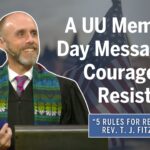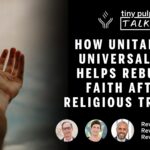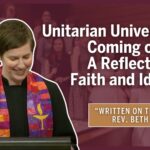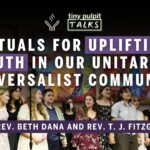Chart and Compass: We Celebrate 125 Years! | Rev. Dr. Daniel Kanter | 10.06.2024
🔥 Help us keep our flame burning brightly! Your completed pledge allows the church to build our 2025 budget.
💙 Pledging online is easy through Realm. Click here to make your pledge today.
Sermon Transcript:
Well, happy birthday to us. As we celebrate all that we’ve been, looking back, we have a chance to look forward. Today, I’m interested in using this 125th birthday of the church to look back and honor who we were, but also to look forward and see who we might be. Don’t you kind of implicitly do that when you have a birthday, you think about the year behind and the year ahead? The kind of personal New Year’s Day, a birthday, always makes me think about the years behind me, and then I start counting how many I might have left, right? But in there’s a kind of motivation for doing things that I want to do and becoming something I want to become. And so, I think that’s a good entrée for us today to not only think about that as each individual here in this place, but also as a church.
And if Richard Gilbert was right in the late 90s in his… The reading that T. J. read, “The church is a school of the spirit, in a time when we have always needed to find courage to face the needs and the moments that we’re in, to ask ourselves what convictions are required of us and how we will weave who we have been and who we will be.” And if Sandra Cisneros is right in the reading at Beth Red, “We wake up today feeling 125 and 124 and 123…” And I’m not going to go all the way down and don’t worry. And all those years past, we look back, and we look forward, and that’s the way it is.
The science fiction writer Octavia Butler wrote an essay in 2000 called A Few Rules For Predicting the Future. In it, she says, “Among these rules is the importance of learning from the past, respecting the law of consequences, and being aware of our perspective.” She wrote, “Most of all, our tomorrow is the child of our today. And the very act of trying to look ahead to discern possibilities and offer warnings is in itself an act of hope.” She said. So that’s what we’re doing today. Here we are full of pride and joy for our 125 years in Dallas, as we should be, and looking forward to what we can be. Just as those who formed this church in 1899 couldn’t imagine us, it’s hard to imagine the Church of 2149, isn’t it? But the hope is that, just like we have carried the DNA of those original founders in our faith and in this church, that they will be carrying the DNA that we set down. This religion of love, as they said in the original organizing documents.
Daniel Limbaugh, in his sermon in 1899, wrote and spoke the words many of you know that says, “Many souls are hungering and thirsting for religious knowledge, truth, and righteousness, to whom the old dogmas, doctrines, and creeds appear outgrown.” 1899. He said, “These persons are at sea without a chart and compass and making shipwreck of their religious natures.” He went on to say, and these are the words you probably don’t remember, “Friends, there are many in Dallas today,” 1899, “both inside and outside the churches who are hungering and thirsting for religion and whose lives will be wrecked religiously if they cannot find one which is rational.” “Freedom of inquiry,” he said. “Whose findings are referred to the reason as the final court of appeal is sure of resulting in harmony of thought and religious sentiments among the inquirers and worshipers than when investigation and belief is bounded by creed.”
What’s he saying here? What this reminds me is that one, we have never been a creedal church. Two, we have never demanded a belief in one thing or another. Three, we have always asked for the place of reason to guide us, and four, that we have always known that a spiritual lens on life feeds the soul. And so, the foundation of our church is reason, but it’s also spiritual encounter, that we understand that we are not here by our own making or just to be entertained, but rather, we are here by the shape of history, by some thoughtful decision-making, by little fortune. And we are here to continue to prepare, in its many forms, a religious and spiritual religious springboard for those who will come through our doors who have not yet arrived. We are here as a part of something even much bigger than all that.
And that thing is continually revealed to us, is never found in one person like Jesus or in one book like the Bible, but ultimately revealed in the many acts of love and mutuality we experience in our lives and the things we open our hearts to. The uncanny coherence of what people who met in Dallas 125 years ago to form this church said and did with what we say and do means one thing to me, that we are strong, because we have grown from a deeply rooted notion about people. We have chosen to live out their commitments, to see the good in humanity and the possibility that what we stand for matters. The commitments and hopes of the church in 1899 live through us. Are a current that lives through us no matter who stands in this pulpit or who sits in that pew. And that is something that is bigger and more meaningful than all our programs and all our desires, and all our plans.
It is a current that runs through us, which is rational, spiritual, loving, and justice-centered. And knowing that this current runs through us so strongly in and of itself helps us predict our future. The fact that we were planted here by people who had no qualms about having their first meeting at what was called the Odd Fellows Hall tells us something. People who had their first worship in a Jewish temple, in a hateful climate of racism and antisemitism in the rise of fundamentalist, literalist Christianity, tells us something about our mission. Asks us to live up to that current that runs through us.
Our history tells us that they made commitments to be a religion of love, integration, women’s rights, children’s agency, liberation, equity and equality, generosity, and hope in all its many forms. And they did this living through the depression, and world wars, and corrupt local governments, and impeachments, and assassinations, and lynchings, and FBI agents sitting in the back pews of this room taking names for McCarthy, and a full-scale damping down of the civil rights movement here in Dallas, and the bombing of black families buying homes in certain neighborhoods, the growth of the city, segregation and desegregation, the Vietnam War, the 60s in general, and so much more. Right?
And they lived through all this committed to not letting the storms of the world divide and conquer them, because they believed in that current that runs through us, that religion of love, and they believe in covenant and the promise to return to each other and turn to each other when times got difficult. All throughout these 125 years, this church has worked for all kinds of justice movements for fair housing. Once a co-owner with other Unitarian churches of Section 8 Property, for Women, the ministers driving pregnant women to get on boats to go out in the Gulf of Mexico when they could get legal abortions when they couldn’t find one in the United States, in the 60s. To the women who led the country with Planned Parenthood of North Texas to create the Roe v. Wade case. We had worked on civil rights; we held the Student Nonviolent Coordinating Committee here, promoted the desegregation of schools in partnership with Northaven Methodist and Temple Emanuel.
We worked for freedom and sexual orientation equity as we welcomed LGBT folks before it was fashionable and located the AIDS crisis in the heart of the church. We worked for radical welcome as we embraced the founders of the Richardson mosque when no one would give them space to pray, and we gave them keys to the building. We did all this while being a school for the spirit, a place where those hungering and thirsting for deep spiritual and religious resources could learn, and engage and rest in the heart of this place. All of this predicts a future where we continue to defend freedoms, address imbalances in our city and country, and try to help real people live lives of freedom. And we do all this as a religious imperative, not a byproduct of our religiosity.
Octavia Butler says in her warning of predicting the future, “Respect the laws of consequences.” She says. I don’t believe we can do anything at all without side effects, also known as unintended consequences. Those consequences may be beneficial or harmful; they may be too slight to matter, or they may be worth the risk because the potential benefits are great, but the consequences are always there. This begs the question of how all this that we’ve been and done creates consequences for what we are today. We have fought uphill against the marginalization in our community that has either depicted us as either dangerous or extraneous. We have been seen as dangerous for challenging the status quo and extraneous by others for not being classically Christian or fitting into any pigeonhole of religious identity that they understand. We have lost members over stances we have taken out or their their own lack of courage to stay with us when things got hot.
We have often confused justice work that we do with the spiritual work that we must do to nurture that justice work. And we have been less than clear that this faith should be a priority in our lives rather than a casual thing. We belong to forgetting that if we embrace this faith as a primary in our lives, we can shine its light brightly in every corner of our lives without hesitation. The consequences of who we have been have had their effect; last night, 70 or 80 protesters against abortion showed up outside at our sidewalks. A nonsensical protest because there are no abortions happening inside this building, as far as I can tell. But I say to them, “Bring it on.” For them to be there only confirms for us what we are doing in promoting the well-being of alive, living human beings and how that is right.
Are we scared of that encounter? Hell no. They can yell and scream all they want, but we’re going to go on supporting people who need help. Yeah. If I can hand out wristbands to all those people out on the sidewalk last night, they would’ve said, “What would Jesus do?” Because I think we’re living the real mission of Jesus’s love right here when we help people who are right in front of us. We can do all this with some humility, some pride in our action, but remember that we’re not the only answer. But all this is predictive, right? We’re getting stronger and stronger at our identity, and so we’re shining our light more broadly around the country and the world. As society struggles with widespread decline in organized religion, we are growing. Did you see how many people were up here on the stage? As our communities see levels of divisiveness we haven’t seen in years, we work to unite. As we deal with environmental degradation, we continue to honor that long commitment of environmental action.
All of this will also come with new consequences that we can handle. Octavia Butler, in her statement, also says about predicting the future. “Be aware of your perspective.” If she is right, this means that any predictions should examine our biases and what we’re missing. We will have to plan for the future by not looking at the people who are already here but looking about who might be coming. Former UUA president and friend of mine, Bill Sinkford, says, “These seekers to our faith want to be invited to build a beloved community. And they are more than willing to help, but they first need to be fed by welcome and worship. They want a religious community that is worth the effort. The world they inhabit is multiracial, multicultural, and multi-religious; often so are their families. The visitors to our congregations want a faith that will help them thrive in the world, so do our long-term faithful members. Our task is to find the power in that pluralism.”
To which I say amen; somebody said amen last time. I can say amen too. Currently, 20% of this congregation is people of color, and the religious education department is even more diverse. Yeah. If that’s surprising to you, it’s because we expect it not to be so. We will in the future, near and far, be a multicultural, multiracial community, but it will take commitments that we have only begun to dream up. We also will have computer screens on this room. Thank you. What holds our present and future are those who invested here and those yet to arrive. Those who cared for our children, those who governed, those who built buildings, those who envisioned a future, those who hired and called ministers. And yes, preach the theology of love, reason, deep commitment to human goodness, justice, and compassion. I count myself blessed among the line of ministers that we represent today who lead this place.
Thank you. A member of our church said to me this week, “You’re doing a great job, Daniel, but…” You always wait and pause for that.
But they said, “You stand on the shoulders of so many, like Laurel Hallman and John Buehrens, and Dwight Brown and Robert Raible.” And I said, “I humbly agree.” And that’s why I’ve spent so much time in Raible’s archives, reading his sermons and reading things that inform us today from the 40s and the 50s and the 60s, that say we build the church because we want to grow and mature the things of the spirit because we want to possess the values human and divine, which this church can inculcate in us and in our children. And I have spent time looking into the future, at the ministers who will come, at the leaders who will come, at the people who will come sitting here in these pews who I will probably never meet, preparing them a place.
Again, Bill Sinkford said, “Our task is liberation into lives of abundance and justice, and joy. Our task is to live as if beloved community is not just an idle dream. We do not need to claim that we have all the answers. Those that are yearning for religious community deserve more truth than that. We do not need to claim that we have reached the promised land, but it should be clear that we have embraced the journey.” So, friends, our future is bright. As we grow into the next 125 years, we must do it with integrity and impact in mind. We must do it continually, opening the circle of this place to all; we must do it in a way that is infused with the conviction of love.
There’s a story of the German poet, Heinrich Heine, who was standing in front of a cathedral in Amiens, in France, with his friend, and his friend says to him, “Tell me Heinrich, why can’t people build piles like this anymore?” Heinrich replied, “My dear friend, in those days, people had convictions; we moderns have opinions, and it takes more than opinions to build a Gothic cathedral.”
So I say it will take more than opinions to build the beloved community of love and justice. It will take we who grow this place with gratitude, who guide this place with spirituality and social action, and have convictions to make this place continue to thrive. It will take those of us who can admit to our spiritual shipwrecks from time to time and that we don’t always feel courageous and yet are still committed to the hopes and the dreams that our spiritual ancestors gave us; it will take never giving up on the religion of love. It will take not hiding who we are, not backing down to commonly held religious beliefs even when they are spoken with such conviction or yelled from the sidewalk. It will take us funding and growing this place with a deep appreciation so that we can be the church in 125 years that is looked back upon with gratitude and love. The future is bright. The past is our instructor; the present is ours to shape. May we be worthy of all this and more. Amen.








